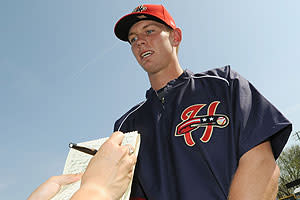Strasburg's station based on dollars, not sense
In late May or early June, the Washington Nationals will summon Stephen Strasburg(notes) from the minor leagues. They will declare him ready for Major League Baseball, even though anyone without wax in their ears could glean that based on the pop of the catcher's mitt when Strasburg unleashes his 100-mph fastball.
All that's preventing Strasburg from pitching Sunday in the big leagues, as opposed to Altoona, Pa., is a clause in baseball's collective-bargaining agreement that for 20 years has encouraged teams to keep their most talented players in the minor leagues simply to avoid paying them more in the long run.
The thrust is simple: If a team parks a player in the minor leagues for at least 20 days to begin the season, it can delay his free agency by one year. Teams looking to save money go a step further and keep players down for about two months, which prevents them from gaining the Super 2 status that gives the top 17 percent of any service class an extra year of salary arbitration.
Because of the service-time rules, the Nationals could save upward of $20 million by keeping Strasburg in the minors until their June 4 series against Cincinnati. They're not the only ones. Cleveland catcher Carlos Santana(notes), one of the game's best prospects, hit two home runs in his first game at Triple-A – and is expected to stay there until June. The Reds shipped Cuban phenom Aroldis Chapman(notes) to Triple-A, San Francisco sent catcher Buster Posey(notes) to its Triple-A affiliate and Tampa Bay dispatched pitcher Jeremy Hellickson(notes) to Durham for a month. Cubs shortstop Starlin Castro(notes) and Marlins slugger Mike Stanton(notes) were certainly among the 25 best players in their camps this spring, and they're still at Double-A for the time being.
It's the rare issue unsatisfactory to both players and management. For nearly every team, the rules make it fiscally irresponsible not to bury roster-worthy players. And it's something both MLB labor relations head Rob Manfred and players' association executive director Michael Weiner hope to change, if not eliminate, after the current CBA expires in December 2011.
Said Weiner: "I don't think anybody would say it's a great situation on the field to hold players back who are major league-ready."
Said Manfred: "We have no interest in this split of the service class. There's no logic to it. Quite frankly, I don't think the people who made that deal realized the ramifications it would have in terms of roster decisions."
The Super 2, invented as a compromise, has turned into an albatross. It forces general managers to come up with flimsy explanations for sending players down – cold weather, short rotations, adjusting to professional life or, in Strasburg's case, slowing down his delivery from the stretch, which even the nitpickiest of nitpicks would have trouble believing – and fans to grouse about waiting to see the next generation.
The mess started in 1973, when Marvin Miller, the players' association head, bullied the owners into implementing salary arbitration. Oakland owner Charlie Finley lamented the decision almost immediately and was quoted far and wide for his thoughts on allowing arbitration: "We'll be the nation's biggest [expletive] if we do this."
Players with at least two years' experience could petition for a higher salary. An impartial arbitrator would decide whether the player's request or the team's proposed salary was fair. That stayed in place until 1985, when owners won a huge battle during collective bargaining by pushing the arbitration threshold back to three full years of service time.
The owners lost some of what they'd gained five years later, agreeing to the Super 2. The theory was that teams could never tell precisely when 17 percent would arrive, so it didn't matter when players were summoned. Little did they know that the number would almost turn into a science where teams could guess the cutoff, which is around May 20. And that with high salaries so pervasive, those first three years of service time – during which a team can pay a player the minimum, $400,000 – became significantly more important than ever, serving as incentive to bury players when in doubt.
"Every economic decision that's made with respect to a player turns on service time," Manfred said. "It's hard to convince a union seniority-based systems aren't a good thing, and it's really hard to convince them to give it up once they have it."
So they're stuck with the following, no matter how backward it may seem.
Let's use Strasburg as an example. A full year of service entails 172 days on the active roster. If Strasburg isn't called up in the first 20 days of the season, it will push his free-agent clock to 2016. That is almost guaranteed. By keeping him down until early June and avoiding Super 2 status, the Nationals could save $18 million, according to a breakdown by the Washington Post. The report compared Strasburg as Super 2 and non-Super 2 player, using Lincecum's projected salaries as baselines:
As a Super 2: $9 million in 2013, $14 million in 2014, $18 million in 2015 and $22 million in 2016.
Not as a Super 2: $3.9 million, $9 million, $14 million and $18 million.
That's $63 million compared to $44.9 million.
By slowing down his delivery, the Nationals meant of his paychecks. And though it's something for which they need not apologize – it's well within the rules – there is something unseemly and unfair about it.
"I need to make good, prudent baseball decisions for the long-term," Nationals GM Mike Rizzo said. "It would've been short-sighted of me and not doing my job to have rushed into going with Stras just to satisfy the fan base.
"Stras needed things to work on in the minor leagues. It was the right thing to do with him. That was the one and only reason."
Rizzo watched the Giants blow the handling of Lincecum's service-time situation. The right-hander was promoted May 6 of his rookie season. Another week or so would have saved him from being a Super 2 – and allowed the Giants to pay him about $1 million this season. Instead, he signed an extension for $10 million this year (including a $2 million bonus) and $13 million next year.
Others have learned, too. The three most hyped rookies last year, Baltimore catcher Matt Wieters(notes), Atlanta pitcher Tommy Hanson(notes) and Tampa Bay pitcher David Price(notes), spent the first two months in the minors. In Wieters' case, the Orioles' explanation made a modicum of sense. The Rays' reasoning regarding Price was specious. Atlanta's? Even more so.
Hanson had spent three years in the minor leagues. He was coming off perhaps the best season ever in the Arizona Fall League. He pitched well in spring training. Before his June 3 callup, the Braves used Jo-Jo Reyes(notes) for five starts and Kris Medlen(notes) for three. In those games, they allowed 33 runs in 40 1/3 innings, and the Braves went 3-5. Hanson went 11-4 with a 2.89 ERA and finished third in the NL Rookie of the Year voting.
And Atlanta finished six games behind Colorado for the wild card.
Would Hanson in the rotation opening day have meant a postseason slot? Impossible to tell. That the question must be asked, though, brings up a particularly fishy-looking situation for Atlanta.
"In retrospect, it's easy to say they sent him down for one reason," Manfred said. "There are some ifs in there. You don't know exactly what they saw at the point in time they sent him down. You also don't know what maturation took place when he's down there. You also don't know if he was ready to do it for a full season. You just don't know. That's why they have the right to decide what 25 they want up."
They do, and it's much easier to stomach in the case of the Orioles, who offered no hope of contention last year. To burn a year of service time – to pull a Lincecum – is practically a fireable offense for a GM. So even if Wieters was nicknamed "God" in college by his teammates because of his freakish abilities, the Orioles weren't going to bite at the hype like a famished fish.
"You can't pretend the issue of time doesn't exist, at least in our case when we were talking about Wieters," Orioles GM Andy MacPhail said. "We had a player with only one year of experience, which he had split between A and Double-A, and while he had played tremendously, he played a demanding position.
"To us, the decision was fairly clear cut. People might think it was driven by one issue. It wasn't."
There are exceptions to service-time manipulation. This year, Atlanta kept Jason Heyward(notes) out of spring training, fearful that the veterans may mutiny if the team did to him what it did to Hanson. Cincinnati skipped Mike Leake(notes) from college into its starting rotation. And last season, Oakland kept 21-year-olds Brett Anderson(notes) and Trevor Cahill(notes) on its pitching staff from start to finish. All should be Super 2s – if the term continues to exist after the next collective-bargaining agreement.
In all likelihood, the Super 2 will be negotiated into the ether. Whether something similar replaces it – like making the cutoff day two years, 90 days to force teams that want to engage in service-time chicanery to lose players for more than three months – or they scrap it and emerge with something new, it needs fixing.
Because right now baseball's rules force the players to earn less money and the owners to field sub-optimal teams. General managers make excuses to fans, players act like it's OK and the vacuum inside which teams should operate – keep the best 25 players for that clubhouse – doesn't exist.
"If we were in that vacuum, it would be a no-brainer," Braves GM Frank Wren said. "All of them would be up."
Mike Stanton mashing home runs and Starlin Castro thrilling at Wrigley. Jeremy Hellickson dazzling Tampa and Buster Posey solidifying a Giants lineup that needs pop. Aroldis Chapman hitting 100 and Carlos Santana a switch-hitting Victor Martinez(notes) clone. And Strasburg, of course. Only Heyward and Chapman equaled his buzz this spring. People are curious. They want to see whether he can be this good, and there's one way to find out: in the major leagues.
And there will be plenty of chances come June, when Strasburg returns from minor-league purgatory $18 million poorer than he should be because another front office manipulated one of the dumbest rules in the game.


